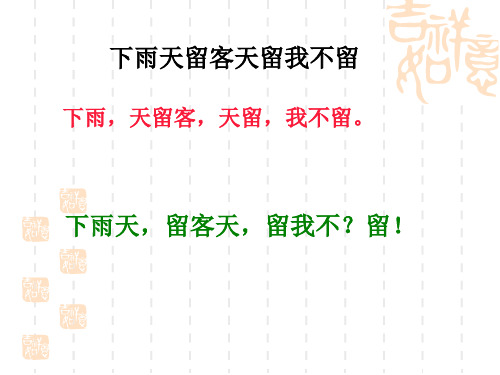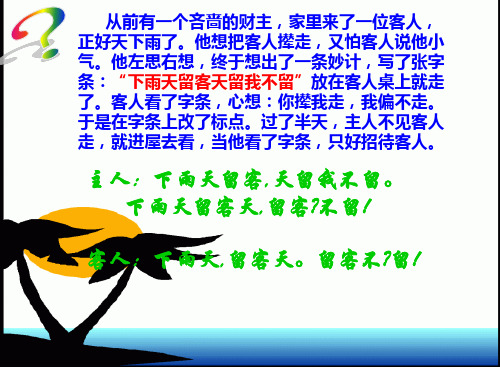下雨天留客天
- 格式:doc
- 大小:24.00 KB
- 文档页数:1


断句笑话二则1. 过去,有个人家中来了朋友,根本没打算朋友在家留宿。
下午天又下雨了,于是这个人写了个条幅“下雨天留客天留我不留”,放在桌子上故意让朋友看见,意思是“下雨天留客,天留我不留”。
但那个朋友就是不走,还念道“下雨天,留客天,留我不?留!”2. 相传明代的书画家祝枝山,在某一年的除夕,应邀给一家财主写了一副对联:明日逢春好不晦气终年倒运少有余财财主看后大怒,当即告到县衙。
公堂上祝枝山却说写的全是“吉庆之词”,财主听后越发怒道:“‘明日逢春,好不晦气;终年倒运,少有余财。
’有这样的吉庆之词吗?”祝枝山听了哈哈大笑,将那对联重新念道:“‘明日逢春好,不晦气;终年倒运少,有余财’难道不是吉庆之词?”。
结果县令和财主闻之面面相觑,无言以对。
文言文断句常见的解题规律且做且思一、试给下列语段断句看有什么特点。
1. 匡衡勤学而无烛,邻舍有烛而不逮,衡乃穿壁引其光,以书映光而读之。
匡衡勤奋好学,但家中没有蜡烛(照明)。
邻居家有蜡烛,光线却照不到他家,匡衡就(在墙上打洞)凿穿墙壁引来邻居家的烛光,把书映照着光来读。
2. 刻削之道,鼻莫如大,目莫如小。
鼻大可小,小不可大也;目小可大,大不可小也。
“举事亦然:为其后可复者也,则事寡败矣刻削的方法是,鼻子没有什么比得上大的,眼睛没有什么比得上小的。
(因为)鼻子大了可以变小,小了就不能变大了。
眼睛小了可以刻大,大了就不能改小了。
做事情也(应该)这样,因为(很多)事情是不可以重来的。
(如果能做到这点),那么事情就很少会失败了。
归纳总结一:找名词(代词)定句读点拨:名词或代词常作主语或宾语,因此找出反复出现的名词或代词,在这些词语前后,就可以确定为停顿的位置。
需要注意(1)文言文中,人名第一次出现时往往用全称,以后再出现就只提名而不提姓。
(2)还有一些专有名词如地名,事名,物名,官名,族名,国名器物名,动物名,植物名,朝代名。
这些名词也往往要断开。
且做且思二、试给下列语段断句看有什么特点。


下雨天留客天天留我不留 下雨天,留客天,天留,我不留. (A statement made by the host.)下雨天,留客天,天留我不留?(A question proposed by the guest.) Punctuation is essential in good writing. It depends largely upon the grammatical structure of a sentence. In order to punctuate correctly, you must therefore understand grammatical elements such as absolute phrases, appositive phrases, prepositional phrases, infinitive phrases, participial phrases, and dependent clauses.I. Definition :putting a right punctuation mark in such a right place that a sentence is clearer an easier tounderstandII. When to use a comma :A. An absolute phrase is always separated from the rest of the sentence by a comma.I shall do as I please , all things considered.B. An appositive phrase is enclosed with commas unless it is restrictive.Looking up words in dictionaries , one of Joyce’s hobbies , is a lot of fun.Every morning Joyce spends 20 minutes listening to Daily Bread , one of her favoriteradio programs.C. An introductory prepositional phrase is set off by a comma when it is long .After getting into her office every morning , Joyce turns on her computer and emailspeople.During the weekdays Joyce is busy and active.D. Introductory infinitive phrases used as adverbs are set off by commas.To be honest , Joyce does’t enjoy teaching Freshman English as much as Grammar.To understand what professors teach in class ,students should preview all the materialsbefore going to class.P u n c t u a t i o n C o m m a sE. Introductory participial phrases are set off by commas. Other participial phrases are also setoff by commas unless they are restrictive.Raised by loving and giving parents, Joyce has learned to return her parents’ love bygiving as much as she has.Tunghai University, located in Taichung, has the most beautiful campus in Taiwan.F. Dependent clauses:1. Noun clauses used as nonrestrictive appositives are set off by commas.One of Joyce’s life-long problems, how she can stay awake until 10 P.M., seemsinsoluble.2. Introductory adverbial clauses are always set off by commas.Although almost everyone thinks English is important, very few people endeavor toexcel in English.3. Nonrestrictive adjective clauses are set off from the rest of the sentences by commas.Jet pilots, who work under a great deal of stress, must stay in excellent physicalcondition.Jet pilots who are in excellent physical condition should not be allowed to fly.III. Restrictive & Nonrestrictive elements限制與非限制Restrictive (Essential) elements (appositive phrases, participial phrases, or adjective clauses) are used to identify or point out a particular person or thing. They play an important role in sentences; sentences have different meanings without these elements.Nonrestrictive (Nonessential)elements are used to add information about the words they modify. Commas have to be used to set off nonrestrictive elements. They don’t change the meaning of the sentences.ExercisePunctuate the following sentences correctly.1.My parents living in Taipei have four granddaughters.2.Shakespeare’s play Hamlet is my favorite.3.Not all bands were equally well received. The band playing Jazz music held the audience’sattention. The other groups created much less excitement.4. A new band called Fats made its debut on Saturday night. The band playing Jazz musicheld the audience’s attention. If this performance is typical, the group has a bright future.5.Italians insist that Marco Polo the thirteenth-century explorer did not import pasta fromChina.6.English language has adopted the words garage and fiancée from the French.7.Jet pilots who work under a great deal of stress must stay in excellent physical condition.8.Jet pilots who are not in excellent physical condition should not be allowed to fly.。


趣味标点1.据说徐渭因家穷,没米下锅的时候,就跑到亲戚朋友家里去,赖着不走,依人生活。
有一次,适逢春雨绵绵,他所寄食的那户人家十分厌烦。
有一天,主人看到徐渭上厕所去了,就在壁上题上一行字,委婉地下了逐客令。
那行字是这样的:“下雨天留客天留我不留”徐渭回来,看到那行字,自然心头明白,但是他不仅不走,还笑嘻嘻道:“既然你这样盛情留我,我就再住下去吧!”说着,提起笔来,给这行字作了圈点:“下雨天,留客天。
留我不留。
”原句:下雨天留客天留我不留(徐渭的想法)留:下雨天,留客天,留我不留!(主人的意思)不留:下雨,天留客。
天留,我不留!凝问:下雨天,留客天,留我不留2.有一个富翁生性吝啬,聘请教书先生时,讲明膳食供给很微薄。
当时,这位教书先生一口应允了。
但借口恐怕口说无凭,写了一张没有加标点符号的合约:“无鸡鸭也可无鱼肉也可豆腐青菜则不可少一分钱也不要”第二天,当富翁端上来一桌素菜时,教书先生大喊大叫,说:“为什么一个荤菜都没有”富翁拿出字据,理直气壮地说:“我们字据上不是写得清清楚楚吗”教书先生也不甘示弱,说出了自己对字据的理解。
原句:无鸡鸭也可无鱼肉也可豆腐青菜则不可少一分钱也不要(富翁的理解)无鸡鸭也可,无鱼肉也可,豆腐青菜则不可少,一分钱也不要。
(教书先生的理解)无鸡,鸭也可;无鱼,肉也可;豆腐青菜则不可,少一分钱也不要。
3.从前,有个财主,好在人前买弄,以显富有。
有一年过春节,他请了一位秀才,让他写副对联。
这位秀才想了想,写了这样一副对联:养猪大如山老鼠头头死;酿酒缸缸好造醋滴滴酸。
财主非常满意,立即叫人贴在大门上,结果引起人们的嘲笑。
原来,这位秀才巧藏标点,故意讽刺这位财主。
如果把逗号放在“山”和“好”后,这副对联则成了“养猪大如山,老鼠头头死;酿酒缸缸好,造醋滴滴酸”,正合财主之意。
而如果把逗号放在“鼠”和“醋”后面,则成了“养猪大如山老鼠,头头死;酿酒缸缸好造醋,处处酸”,如此,难免引人嘲笑。
文言文节奏划分专题复习教学目标:1、能正确的掌握文言文句子朗读节奏划分的方法。
2、培养学生阅读文言文的能力。
3、加深对文言文课文内容的理解。
教学重难点:能正确的掌握文言文句子朗读节奏划分的方法一、笑话两则1、下雨天留客天天留我不留下雨天,留客天,天留,我不留下雨天,留客天,天留我不?留!2、麻子无头发黑脸大脚不大好看(试着读一读,看看有几种读法?)二、方法探究(一)句首表示领起的词语或关联词语之后,应当停顿。
•夫/战,勇气也”,•然则/北通巫峡,南极潇湘……•若夫/霪(yín)雨霏霏(fēi),连月不开……•且/欲与常马等不可得•以/其境过清,•句首发语词:如“至”、“若”、“至若”、“夫”、“若夫”、“盖”、“然”、“则”“然则”、“岂”、“岂若”、“宜”、“诚宜”、何尝、其等。
•关联词:且、虽、因、“惟”、“故”等。
(二)“古二今一”词语之间要停顿。
(古代是两个单音节词,而现代汉语中是一个双音节词要分开读)•可/以一战。
•今/天下三分……•今齐地/方千里,百二十城。
•故/天将降大任于/是人也(三)主-谓-宾之间要停顿1.主谓之间要停顿•臣之妻/私臣……•盖余之勤且艰/若此。
2.谓宾之间要停顿。
•臣诚知不如/徐公美。
•先帝不以/臣卑鄙。
•寻/张怀民•亲/贤臣,远/小臣3.充当状语的名词和中心词之间要连读,即名词作状语时,一般在该词前停顿,且不能把状语与中心词读开。
若分开读,就错将状语当成了主语,改变了句子的意思。
•如:①其一/犬坐/于前•②有亭/翼然/临于泉上者• 三行/六七里(四)句式整齐的句子,朗读时可用相同的停顿来读,使语气语调一一气呵成。
例:1.至若/春和/景明,波澜/不惊,上下/天光,一碧/万顷2. 鸢飞/戾天者,望峰/息心;经纶/世务者,窥谷/忘返(五)节奏停顿要体现出省略成分•“便要/(渔人)还家”•一鼓作气,再/而衰,三/而竭。
(六)、语句倒装之处要停顿•受任/于败军之际,奉命/于危难之间•刻唐贤今人诗赋 /于其上。